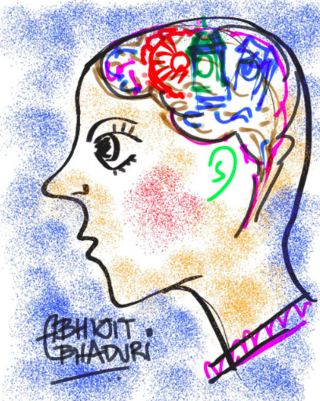Memory
When Probiotics Make You Worse
A recent study shows a surprising link between probiotics and brain fog.
Posted September 30, 2018 Reviewed by Kaja Perina

Probiotics have become a common way to treat conditions such as irritable bowel syndrome, and various formulations even have decent medical data (such as Align for IBS and VSL3 for ulcerative colitis) in their favor. However, some patients take probiotics and feel even worse. Symptoms can include cramping, gassiness, diarrhea, fatigue, and even brain fog or memory problems. Often these symptoms intensify just after a meal. Recently, a group of researchers in Augusta, Georgia made an attempt to try to figure out what was going on. The study is open access, so take a look.
They followed a group of patients who presented to their GI clinic of a period of three years. Anyone who came in with gas, bloating, and a complaint of brain fog (two or more of these symptoms for at least three months: mental confusion, cloudiness, impaired judgement, poor short-term memory, and difficulty concentrating) were included in the study. All people on antibiotics, those with a history of short gut after colon surgery, or those with other reasons for gassiness or abdominal pain (such as colitis or known dysmotility syndromes) were excluded. A few patients who didn't have brain fog but had abdominal symptoms were included for comparison. The researchers were left with a cohort of about 42 patients with abdominal bloating, 34 with bloating and brain fog, and no known reason why. The cognitive symptoms usually lasted between 30 minutes to several hours after a meal, and in 13% were so severe that the patients had quit their jobs.
These patients then had a comprehensive work-up, including cultured aspirates of the upper part of the small intestine to see what bugs were growing there, a sugar breath test to determine if the gut microbiome was producing too much hydrogen or methane gas (a sign of bacterial overgrowth), and tests for lactic acidosis during and after the sugar test to see if lactic-acid producing bacteria were growing after the test subject ingested glucose (or fructose, for the diabetics). They also had motility tests to see how fast their guts worked, using cool technology like a transmitting "smart pill."

Of note, all the patients who complained of brain fog were taking probiotics that contained lactobacillus or bifidobacterium species that produce D-lactate that could presumably lead to both GI and brain symptoms and a temporary lactic acidosis in the body. Additionally, 37% were eating yogurt daily. Only one patient who had abdominal symptoms but no brain fog at the time of the study was taking probiotics (Lactobacillus rhamnosus).
It is already known that overgrowth of D-lactate producing bacteria cause bloating and brain fog in people with short gut syndrome, will we find the same process in people with intact guts? Well, after all this testing, about 63% in the brain fog group were diagnosed with small intestinal bacterial overgrowth (either by the breath test or by a positive upper bowel culture.) All of these had d-lactic acidosis. In the smaller, non-brain fog group, only 25% had small intestinal bacterial overgrowth.
So what did they do about it? All the patients with evidence of small intestinal bacterial overgrowth were treated with antibiotics (different ones depending on allergy history and the bacterial culture) and asked to stop probiotics and yogurt. These patients were followed for 6 months, and 70% of the patients had improvement in symptoms, both cognitive and gastrointestinal. 85% had improvement in brain fog alone. The non-brain fog group with bacterial overgrowth were also treated, with similar resolution of their gastrointestinal symptoms.
Okay, take a breath. That's a pretty complicated scenario, but here is basically what the researchers think is happening. Let's go back to the example of patients with a short gut, who are missing some of their intestines, usually due to surgery of some kind. Some of these patients, when they eat a lot of starch or sugar, have a known occurrence where they can't get rid of all the carbs before it hits the gut bacteria (all simple carbs are supposed to be digested and taken out of the gut before they hit the colon, but people with short guts don't have the capacity to do this in time). The bacteria get a huge feast of simple starches and sugars and go absolutely nuts. These bacteria produce a sugar, d-lactate, that humans don't normally produce in large quantities, and our livers can only digest it slowly. So if the gut bacteria produce a ton of it, our livers can't keep up, and we end up getting too much acid in the blood to the point where it adversely affects brain function (called D-lactic acidosis and encephalopathy).
The Atlanta researchers seem to have found a group of people, all probiotic users, who had the same symptoms, but they had normal guts, structurally. Many of them had small intestinal bacterial overgrowth (bacteria are supposed to live in the large intestine or colon, not the small intestine). While probiotics are designed to be delivered to the colon, it's possible some were missing the target, possibly leading to significant abdominal and cognitive symptoms.
The weakness of this particular study is there was no control group, it's just observational, and includes only people with symptoms severe enough that they were referred to a big time specialty GI clinic. Also there was no lactic acidosis test at baseline. Not surprisingly expert members of the international probiotics association had some biting criticism of the whole thing, specifically that the term "brain fog" seems so fuzzy and nonspecific. Clearly there are thousands upon thousands of folks who take probiotics without these severe symptoms.
My favorite gut microbiome and brain experts, John Cryan and Ted Dinan, who helped write The Psychobiotic Revolution, are more cautious. The book's other author, Scott Anderson, noted recently on Twitter that positive data for probiotics is out there, but slim, and they prefer advising patients to eat fermented foods and prebiotics (the complex fibers that feed the microbiome) until better probiotics are developed.
My take? Well, if you've been taking probiotics and they don't seem to help, there's no reason to keep taking them. If you take them and you feel worse, especially just after eating, it also seems prudent to quit taking them. You may want to ask your friendly neighborhood GI doc about small bacterial intestinal overgrowth if you have debilitating abdominal bloating, gas, and especially if you have associated serious cognitive symptoms, especially if they seem to fluctuate after meals. There are formulations of probiotics that do not contain D-lactate producing species...a quick google search seems to indicate these are mostly marketed to kids with autistic spectrum disorder. With most gut-brain connection recommendations, the jury is still out as to whether probiotics are helpful or a waste of money in these cases.
In a few weeks, I'll be attending the Harvard Probiotics Symposium, and I'll be sure to get back to you with the latest developments, strides forward, disappointments, and surprises.
Copyright Emily Deans MD




